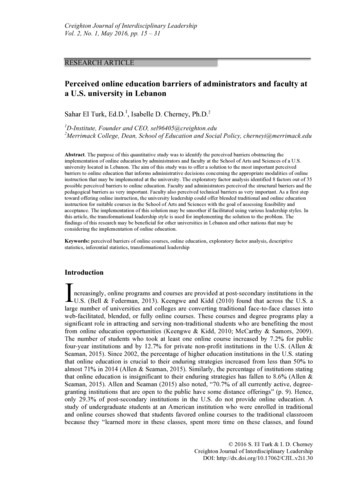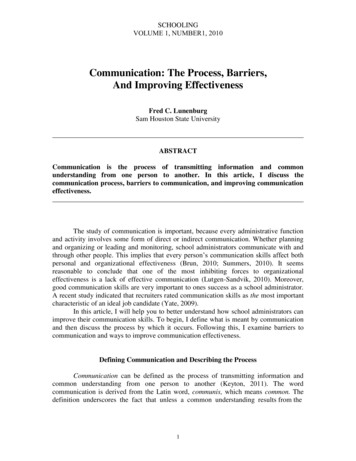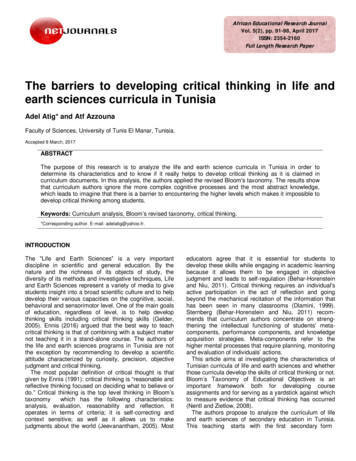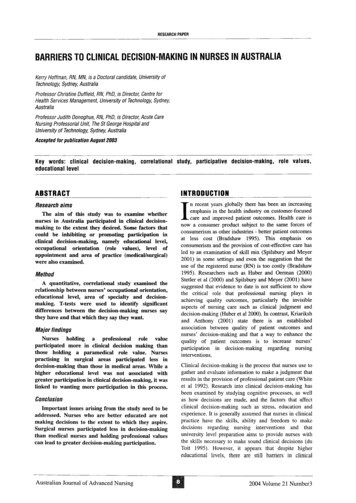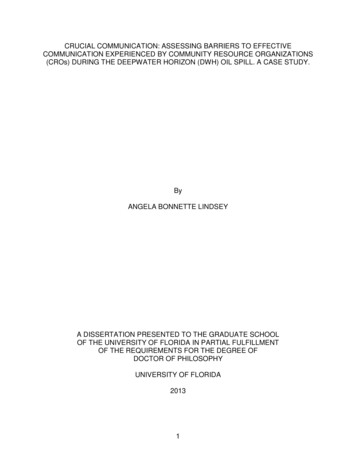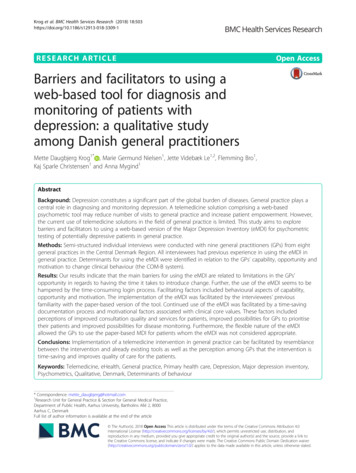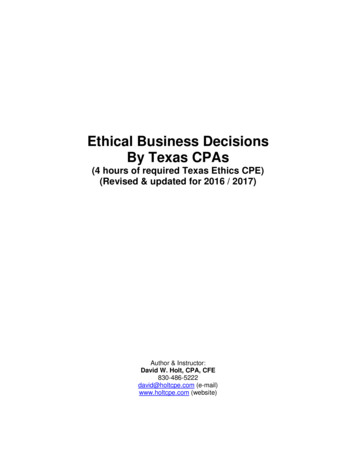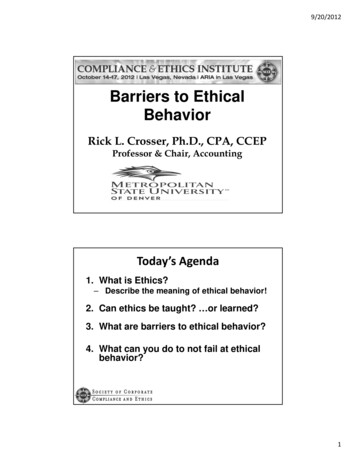
Transcription
9/20/2012Barriers to EthicalBehaviorRick L. Crosser, Ph.D., CPA, CCEPProfessor & Chair, AccountingToday’s Agenda1. What is Ethics?– Describe the meaning of ethical behavior!2. Can ethics be taught? or learned?3. What are barriers to ethical behavior?4. What can you do to not fail at ethicalbehavior?1
9/20/2012If -- Through Life’s ExperiencesYou Obtain Adequate Moral Fiber Then you are prepared for ethicalsituations in which you are confronted. So, with the proper inputs outcomes are predictable. “In any moment of decision, the best thingyou can do is the right thing.”Theodore RooseveltBut, where is necessary moral fiber found?2
9/20/2012A Quick Story From This A.M.This image cannot currently be display ed.Can Ethics Be Taught? Please reflect .to yourself, at thistime.3
9/20/2012Consider Taking a Wine-TastingCourse What if thecourse waspure textbookandlecture?.i.e. apassiveexperience ?You would have to imaginehow the wines taste, but notactually taste them4
9/20/20125
9/20/2012Can Ethics be Learned? Based on the research of Dr. James Kohlberg and Dr.James Rest – Kohlberg discovered 6 Stages of Moral Reasoningfoundations– Beginning w/ doing the right thing Because of1.Punishment2.Rewards3.Following social groups4.Following norms, rules, laws5.Individual Rights6.Universal concern for human rightsand fairness – regardless of lawsDr. James RestEducation / Experience causes movement tohigher Stage!– James Rest relied on Kohlberg Moral Sensitivity (Issue Awareness) Moral Judgment Moral Motivation Moral Character– Defining Issues Test (DIT2)– But, Barriers exist6
9/20/2012The Dirty Hands Problem Choices are hard and can be painful! Utilitarian – Consequences with thehighest benefit or least harm for thegreatest number. (Jeremy Bentham &John Stuart Mill) President Harry Truman’s dilemma!Back to the Question: What is“Ethics?” or, “Ethical Behavior?”The Rules - Accepted standards of behavior Practices of those in a profession Laws Expectations of society / community But the heart (character) aids decision-making7
9/20/2012Aristotle (384 BC – 322 BC)Cliff Clavin (1982 – 1993)8
9/20/2012AristotleHappiness is the Ultimate Purpose ofHuman ExistenceAristotleHappiness is the Ultimate Purpose ofHuman Existence rity,Impartiality, ess.9
9/20/2012AristotleHappiness is the Ultimate Purpose of HumanExistenceSCCE Code of EthicsAristotle’s Virtues rity,Impartiality, ess. The services weprovide require thehighest standards ofprofessionalism,integrity &competence. unprejudiced andunbiased judgment onbehalf of an employer Confidentiality Trust“Obedience to Authority: AnExperimental View” (1974)Stanley Milgram (1933-1984)10
9/20/2012The Milgram Experiment(s) Conducted at Yale University 1960’s –1970’s Stanley Milgram was questioning whypeople would do evil,–While asserting that they were justdoing their jobs–Nuremberg Trials, Post‐WWII–And Adolf Eichmann trial 1961The Experimental Construct 3 playersE Experimenter (wears a light blue jacket); heknows what is going on. An actor. In the original,this was Stanley Milgram’s role.T Teacher (clothing, off-the-street); this person isthe subject of the experiment.L Learner (hidden behind a wall initially); an actornot really present during the actual experiment.Sounds are tape recorded. The purported (false) experiment was to examine iflearning improves if punishment (shock) is inflicted11
9/20/2012Results Before the actual experiment, Yalestudents & faculty responded that only1.2% would inflict maximum voltage. ? % of subjects administered themaximum, 450-volt shock (1961 - 1974). Now the video (2007 ABC News): watchthe body language of the subject(Teacher) What are the subjects saying? Conclusions?12
9/20/2012The Milgram Experiment VideoConclusions Beware of unjust authority. Although many throughout history have usedthe excuse or defense, “I was just doing myjob,” NO court has ever relied upon thatdefense. Know and practice the right thing to do. Get help.– a power to resist authority with groups 413
9/20/2012The Parable of The Sadhu The video clip of a dilemma Group vs individual actions What was the preconceived notion of thegroup?– What were the group goals? What happened to the Sadhu?Buzz McCoy and The Parable14
9/20/2012Conclusions Leadership is necessary to– Plan actions to meet objectives– Execute the plan– And help lead through contingencies that mayhave ethical dimensionsLincoln Hall (1955-2012) The web clip from Today Show and MSNBC What was different in the characteristics ofthe group? What happened to Dan Mazur’s guidebusiness after the event and the worldwidepublicity? 327483115
9/20/2012Tragedy on EverestWhat Are the Differences?LeadershipPlanGoalStrong ethical dispositions–Related to human life Dan Mazur’s Guide business suffered fora couple of years 16
9/20/2012A TestCount the number of basketball passesthe team in white makes.17
9/20/2012The moonwalking bear test, otherwiseknown as “In-Attentional Blindness” Cell phones can divert attention from drivers. A submarine commander looks through hisperiscope and sees no ships nearby. He orders the ballast blown and the submarine tosurface. He then hears the clank of a ship hitting his deck andrealizes that he has surfaced with another shipdirectly overhead. Failure to see key information during a decisionmaking process. Also, “Change Blindness”– Gradual change over time– Arthur Andersen failed to see all that washappening at EnronOur Session Summary #1 Reflect on your experiences (teachyourself)–Case #1: A situation when youacted ethically How did you do it, or how did yourespond to an unjust authority?–Case #2: When you succumbed tounethical behavior – why did youdo it? What was different?18
9/20/2012Our Session Summary #2 Plan for the next dilemma: Consider Cases#1 vs #2 above– Consider individual versus organizationgoals Beware of obedience to unjust authority Keep your head up – be attentive to what ishappening around you– Ask for help!The EndThank you!“Have the courage to say no.Have the courage to face the truth.Do the right thing because it isright.These are the magic keys to livingyour life with integrity” .W. Clement Stone (1902-2002)19
The Parable of The Sadhu The video clip of a dilemma Group vs individual actions What was the preconceived notion of the group? –What were the group goals? What happened to the Sadhu? Buzz McCoy and The Parable. 9/20/2012 15 Conclusions Leadership is necessary to – Plan actions to meet objectives – Execute the plan – And help lead through contingencies that may have .

